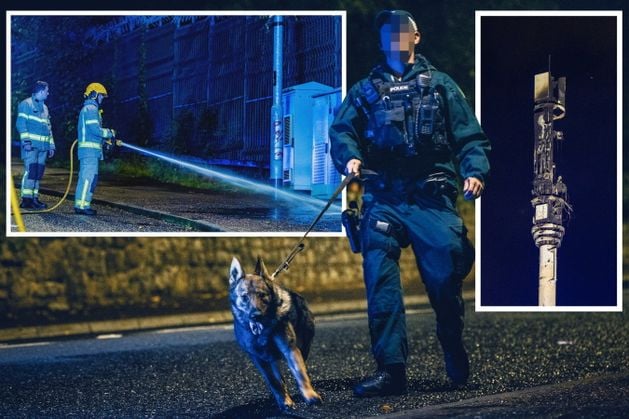They said the 45-year-old man was arrested following a planned search of a property in west Belfast on Thursday.
They said he has been arrested on suspicion of 26 counts of arson and remains in police custody.
PSNI Detective Inspector McAnee said: “We are very aware of the damaging impact these incidents are having on the community.
“The disruption to network signal is affecting many people’s day-to-day lives, particularly those who are more vulnerable and rely on these services for their healthcare, work and connection with others.
“This remains an active investigation with multiple lines of enquiry being pursued. We are committed to catching those responsible and stopping these attacks.”
Earlier this week, a court heard that police believe there to be a network of conspiracy theorists behind an escalating campaign around the targeting of the masts.
The details emerged after 44-year-old Darren Clarke, of no fixed abode appeared in Belfast Magistrates Court on Tuesday facing a charge of arson with intent to destroy a 5G mast belonging to the O2 network.
Fire crews were called to extinguish the blaze at the telecommunications structure at Whiterock Road late on Sunday night.
The court heard police spotted a man wearing dark clothing, a head torch and carrying a backpack a short time later on Divis Drive.
He rode off at speed on a bicycle, but was chased into Milltown Cemetery on the Falls Road.
Clarke was arrested inside the graveyard while smelling strongly of either fuel or nail polish.
The hearing heard an investigating detective say the incident has been linked to a wider series of 18 arson attacks on 5G masts across west Belfast since 2023.
“The total cost of the damage… is anticipated to be in the region of £4m,” he disclosed.
Bail was opposed amid claims Clarke could become involved in further incidents or obstruct the ongoing investigation.
Clarke’s barrister, Michael Halleron, argued that the alleged conspiracy views about the masts could possibly provide him with a defence at any future prosecution.
“All he would have to prove is whether he had a reasonable belief at the time,” Mr Halleron contended.
“That could be complete nonsense, looking at it objectively, but it is all on the basis of his subjective belief.”
Refusing bail, Judge Keown cited the risks of re-offending, harm to the public and interference with the police investigation.
Clarke was remanded in custody until October 7.
